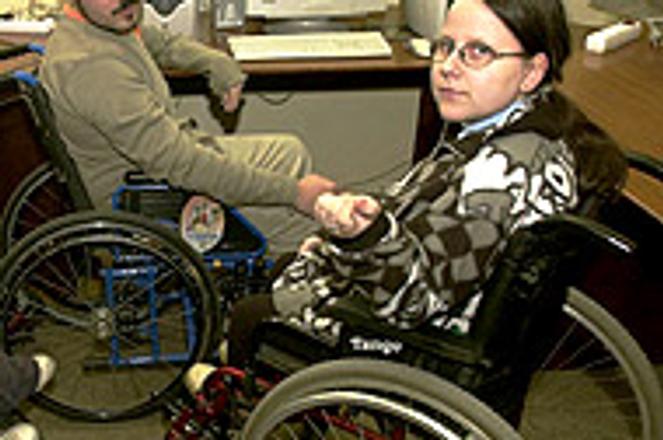MANY are upset by stricter disability definitions.photo: TASR
OVER 53,000 severely physically disabled people have lost their compensation benefits for care and higher clothing and hygiene expenses.
The new social assistance law has implemented tougher criteria for granting these compensations. The Ministry of Labour, Social Affairs, and Family said its ultimate goal was to reduce the abuse of the benefit system.
However, the representatives of the physically disabled warn that the measure strikes at a vulnerable group of society and they are trying to push through changes to the legislation.
The number of people receiving contributions grows year by year. According to the Ministry, this does not correspond with the state of the population's health.
According to official data, 240,000 out of Slovakia's 5.5 million inhabitants currently have legal status as severely physically disabled people, which represents 4.4 percent of the population.
In 2002 the government paid more than Sk5 billion (€125 million) for the contributions. In 1996 it was only a little over1 billion (€25 million).
The benefits can be requested only on the basis of severe disability. However, the revision to the law on social assistance has erased the possibility of taking into account several connected health problems.
If physicians do not evaluate the citizen's condition as a 50 percent disability, the disabled person loses the special legal status and state assistance. Based on the new criteria, 5,000 people have been excluded from the list.
An organisation sheltering the physically disabled say it was mainly people who have a physical disability combined with a degenerative disease who were excluded.
"The authorities will basically exclude people from the list by taking into account their main health disability and disregard their additional health problems," said Milan Mněchura from the Prievidza-based Union of Blind and Tender-eyed People told the daily SME.
The new checks do not ascertain whether the main disability has worsened.
"We advise those who were excluded from the system not to appeal the decision but to request a new evaluation," he said.
The bill amendment accommodated foster parents, who can request contributions for an adopted child. A son or daughter in law looking after their parents in law can now receive the care contribution as well.
However, Monika Vráblová from the Slovak Association of Physically Disabled People told The Slovak Spectator that even people who have real problems with walking have lost their entitlement to legal status.
Without this legal status they cannot park their cars in reserved parking areas, ask for a parking place near their home, or travel for free on public transport with an accompanying person.
Vráblová said that, in officials' eyes, a member of her organisation became healthy overnight despite the fact that she has one leg amputated and has an artificial joint in the second.
The loss of a leg under the knee does not allow for identification as a disabled person, as the bill acknowledges this kind of handicap only as a 40 percent physical disability.
"We assess the changes very negatively and we are trying to change them by submitting objections to this norm to the relevant state bodies," Vráblová told The Slovak Spectator.
The changes also affected the bill on social security, toughening the criteria for granting disability pensions. The stricter rules outraged miners, who have already protested and intend to take to the streets again.
However, Martin Danko, spokesman of the Ministry of Labour said that, though the ministry does not currently plan any corrections to the law, they might loosen certain criteria and increase the compensations if the economy continues to perform well.
"This is possible thanks to the positive effects of the reforms," Danko told The Slovak Spectator.


